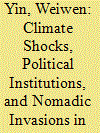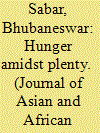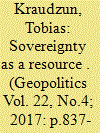|
|
|
Sort Order |
|
|
|
Items / Page
|
|
|
|
|
|
|
| Srl | Item |
| 1 |
ID:
174721


|
|
|
|
|
| Summary/Abstract |
While a large literature argues negative climate shocks can trigger conflicts, recent findings suggest moderate climatic conditions lead to war. This article proposes a conditional theory by incorporating political institution as a moderating variable. I argue that, under the impact of negative climate shocks, centralized societies can mobilize more resources for war, compared to decentralized societies. Thus, the former is more likely to resort to well-organized plundering to address the scarcity problem caused by detrimental climate shocks. Besides, centralized societies have little incentive to plunder when the climatic conditions are moderate, as they can collect taxes regularly through centralized institutions. A comparison between the more centralized Manchurian and the less centralized Mongols on their conflictual behavior serves as an empirical test. I find that temperature was negatively associated with the probability of Manchurian invasion after they embraced centralization but had a positive effect on the likelihood of Mongol invasion.
|
|
|
|
|
|
|
|
|
|
|
|
|
|
|
|
| 2 |
ID:
126859


|
|
|
| 3 |
ID:
153652


|
|
|
|
|
| Summary/Abstract |
This paper illustrates how politics on resource entitlement have historically shaped the vulnerable condition of people in Nuapada district (formerly Nawapara sub-division of Kalahandi district) of Orissa, India. It finds that the underutilisation of existing resources in the district, backed by loopholes in district administration, has widened the vulnerability conditions of local people. The collapse of the state command economy during post-economic reform and the subsequent withdrawal of welfare state from welfare activities, which opens space for elite groups and middlemen to exploit both resources and local people, have caused serious disruption in the development of the district as evident from the declining livelihood options and increasing distress migration. Thus there is a need to bring reform in equitable distribution of resources at the state level.
|
|
|
|
|
|
|
|
|
|
|
|
|
|
|
|
| 4 |
ID:
175391


|
|
|
|
|
| Summary/Abstract |
This article evaluates the impact of natural resource conflicts on Africa’s security. This study is qualitative and based on secondary data that were analysed textually. Hinged on the greed and grievance theory, the study argues that the mismanagement of resources, greed and grievance have had immeasurable negative implications on national security, national growth and development. The issues that have come to the fore in resource management in some selected African countries include rancorous intergroup relations, militancy, the proliferation of small arms and light weapons, leadership ineptitude, corruption, warlordism and money laundering. The article recommends that effective resource management strategies in Africa are key in curbing the plaguing security challenges and conflicts ensuing from resource ownership in the continent.
|
|
|
|
|
|
|
|
|
|
|
|
|
|
|
|
| 5 |
ID:
133000


|
|
|
|
|
| Publication |
2014.
|
| Summary/Abstract |
The UK has legally binding renewable energy and greenhouse gas targets. Energy from biomass is anticipated to make major contributions to these. However there are concerns about the availability and sustainability of biomass for the bioenergy sector. A Biomass Resource Model has been developed that reflects the key biomass supply-chain dynamics and interactions determining resource availability, taking into account climate, food, land and other constraints. The model has been applied to the UK, developing four biomass resource scenarios to analyse resource availability and energy generation potential within different contexts. The model shows that indigenous biomass resources and energy crops could service up to 44% of UK energy demand by 2050 without impacting food systems. The scenarios show, residues from agriculture, forestry and industry provide the most robust resource, potentially providing up to 6.5% of primary energy demand by 2050. Waste resources are found to potentially provide up to 15.4% and specifically grown biomass and energy crops up to 22% of demand. The UK is therefore projected to have significant indigenous biomass resources to meet its targets. However the dominant biomass resource opportunities identified in the paper are not consistent with current UK bioenergy strategies, risking biomass deficit despite resource abundance.
|
|
|
|
|
|
|
|
|
|
|
|
|
|
|
|
| 6 |
ID:
174793


|
|
|
|
|
| Summary/Abstract |
Northeast India, a ‘zipper region’ that gives impetus to Southeast Asian and Himalasian studies, is marked by complexities and ambiguities. The paper examines the multiple identity construction in contemporary Assam, the central state of this region and seeks to recover the other experiences that make ethnic life-world possible while challenging the ethnocentric discourses—in academia, politics, public and social movements. Acknowledging the presence of common or possibly universal processes behind the production of such discourses, it aims to interrogate the factors that cut across socio-cultural, political-economical or ecological dimensions. It further examines the multiple discourses and narratives that makes that social possible in the region. In doing so, it locates the strategic positioning of such discourses and how they deal with Indian nation-state and beyond. This paper in essence is interested in the question of possibility of various discourses—as a question of post-history.
|
|
|
|
|
|
|
|
|
|
|
|
|
|
|
|
| 7 |
ID:
156828


|
|
|
|
|
| Summary/Abstract |
This paper scrutinises the translation of sovereignty into daily actions at the border. The Soviet Union established a heavily securitised and sealed border, which was perpetuated in post-Soviet, civil war-stricken Tajikistan by assigning the task to the Russian Federation’s border forces. After having taken over the task of guarding the border, the slowly recovering post-conflict state tried hard to maintain its own border control. Drawing on interviews with borderland people, this article discusses the convergence of Tajikistan’s strong claim but weak support for sovereignty, with the daily life of the borderland people. It will show how – given the Pamirs’ special status as a border district – far-reaching sovereign authority of state agents, aiming to provide security at the border, has been translated into arbitrary actions ensuring individual benefits and has been hidden by intransparency. The article argues that the lack of adequate support from the central government encourages state representatives at the border to reinterpret the sovereign power assigned to them in order to serve their own individual benefits and purposes. Instead of being used to maintain the state territory, the sovereignty’s power is diverted to serve individual interests, in the end serving to destabilize the border, the opposite of the intended purpose.
|
|
|
|
|
|
|
|
|
|
|
|
|
|
|
|
| 8 |
ID:
093224


|
|
|
|
|
| Publication |
2009.
|
| Summary/Abstract |
Every dictator dislikes free media. Yet, many nondemocratic countries have partially free or almost free media. In this article, we develop a theory of media freedom in dictatorships and provide systematic statistical evidence in support of this theory. In our model, free media allow a dictator to provide incentives to bureaucrats and therefore to improve the quality of government. The importance of this benefit varies with the natural resource endowment. In resource-rich countries, bureaucratic incentives are less important for the dictator; hence, media freedom is less likely to emerge. Using panel data, we show that controlling for country fixed effects, media are less free in oil-rich economies, with the effect especially pronounced in nondemocratic regimes. These results are robust to model specification and the inclusion of various controls, including the level of economic development, democracy, country size, size of government, and others.
|
|
|
|
|
|
|
|
|
|
|
|
|
|
|
|
|
|
|
|
|